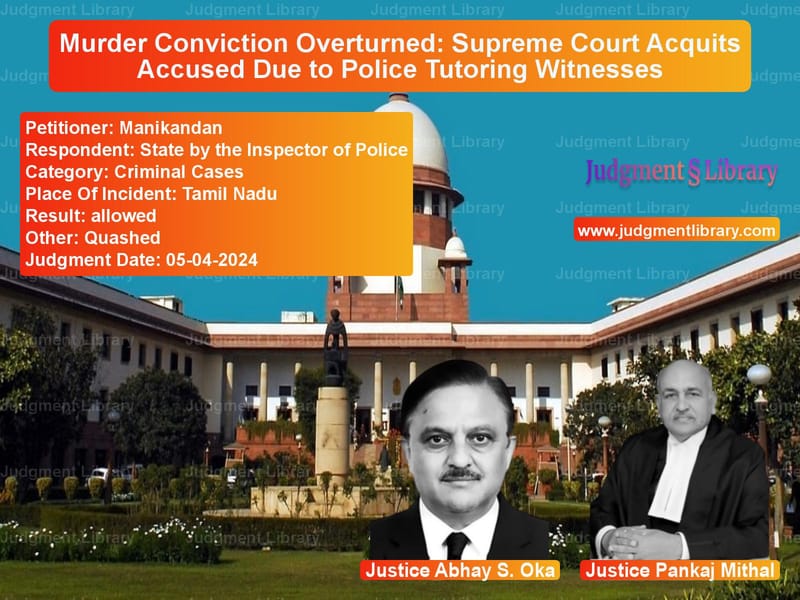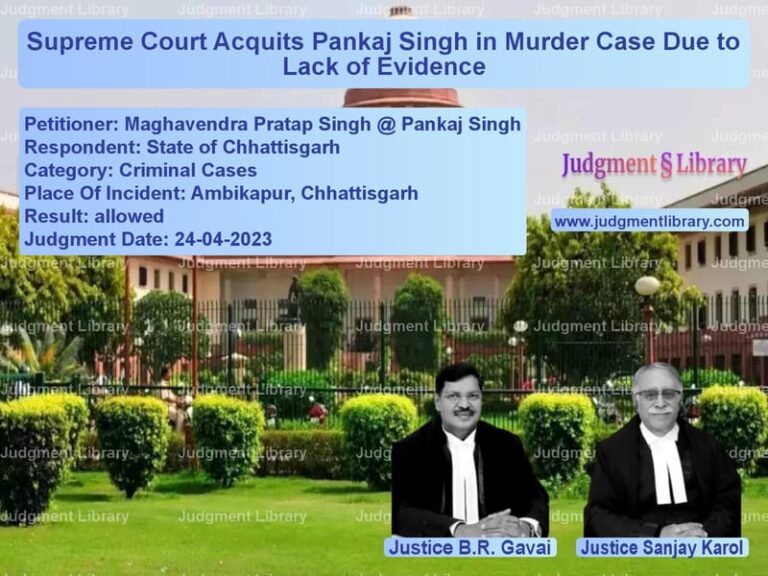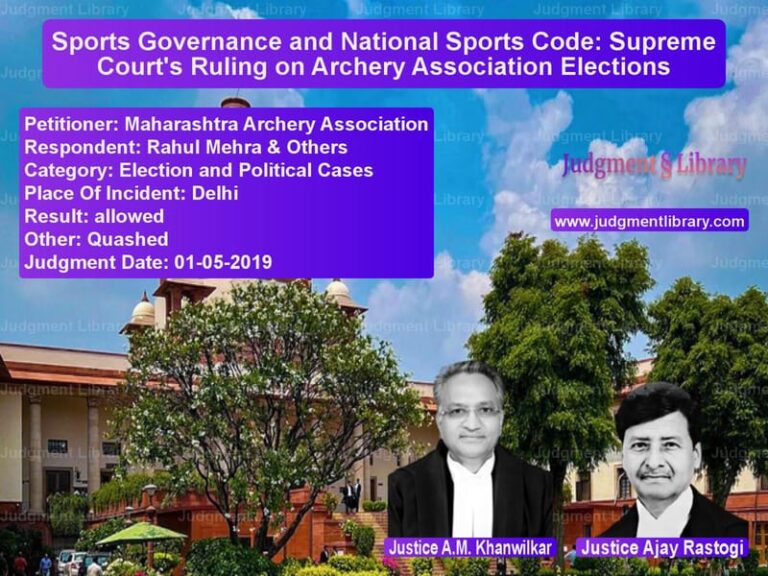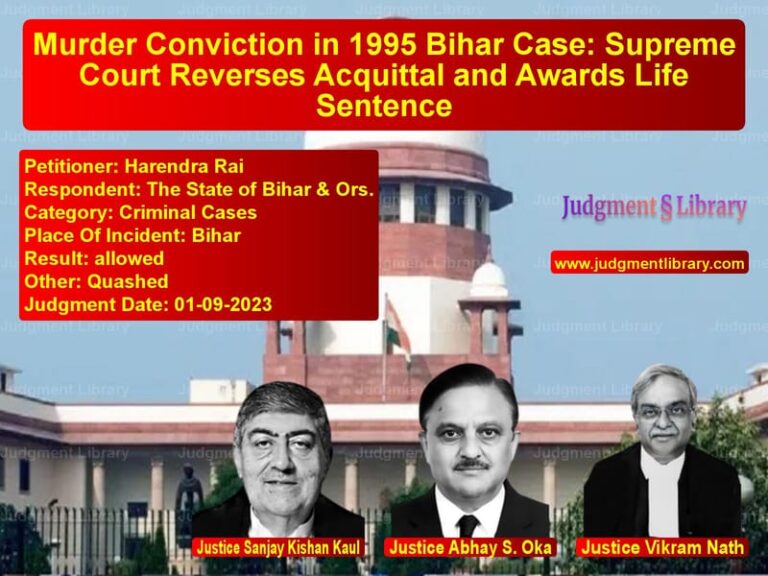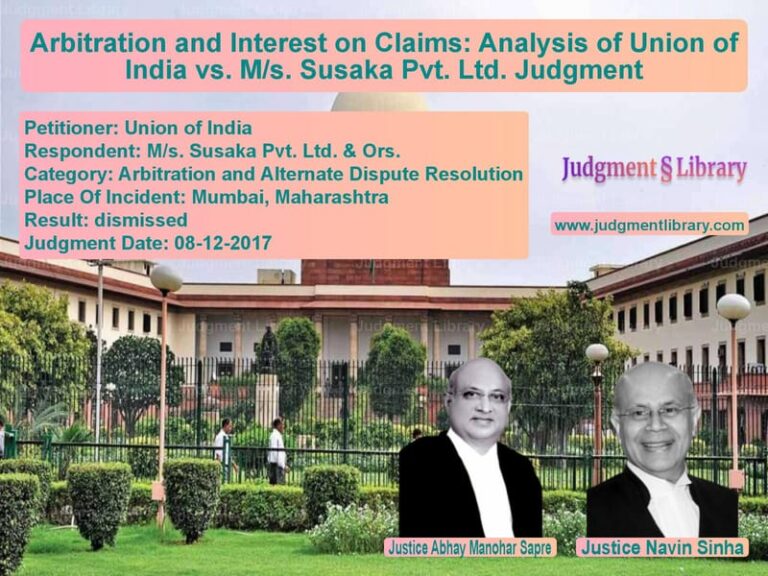Murder Conviction Overturned: Supreme Court Acquits Accused Due to Police Tutoring Witnesses
The Supreme Court of India recently overturned the conviction of two men accused of murder in Manikandan v. State, citing police misconduct in tutoring key witnesses. The case involved allegations that the accused killed a man named Balamurugan following a dispute. Both the trial court and the High Court had convicted the accused under Section 302 read with Section 34 of the Indian Penal Code (IPC), sentencing them to life imprisonment. However, the Supreme Court found serious flaws in the prosecution’s case and acquitted the accused.
Background of the Case
The case stemmed from an incident on October 4, 2007, when the deceased, Balamurugan, allegedly confronted the first accused over a dispute regarding the delivery of food. The prosecution claimed that after an argument, the first accused attacked Balamurugan with a billhook, while the second accused restrained him, leading to his death. The prosecution relied on eyewitness accounts from the victim’s family members.
The trial court convicted both accused based on these eyewitness testimonies. The High Court upheld the conviction, prompting the accused to appeal to the Supreme Court.
Arguments by the Appellants (Accused)
- The defense argued that the prosecution’s case was unreliable as it relied exclusively on testimonies from the victim’s relatives.
- They pointed out inconsistencies in the timeline, as the first information report (FIR) stated the murder occurred at 10:30 PM, but the post-mortem report suggested it happened earlier.
- They argued that independent witnesses who were present at the scene were not examined.
- They contended that the accused were not present at the scene, and the incident resulted from a sudden fight initiated by the deceased.
Arguments by the Respondent (State)
- The prosecution insisted that the evidence of the victim’s family members was reliable and consistent.
- They argued that the accused’s actions—attacking the victim and restraining him—proved intent to kill.
- They asserted that the accused were responsible for the victim’s death, and their conviction should stand.
Key Observations of the Supreme Court
- The Court found that the prosecution’s case was compromised due to police interference. The victim’s relatives, who testified as eyewitnesses, admitted in court that they had been “taught” by the police at the station a day before their testimony.
- The Court noted: “The prosecution witnesses were called to the police station and were taught how to depose in a particular manner. This is a blatant act by the police to tutor material prosecution witnesses.”
- The Supreme Court ruled that the reliability of tutored witnesses is questionable, especially when no independent witnesses were examined despite their availability.
- It also found that the case had significant contradictions, particularly regarding the time of death and the absence of corroborating evidence.
Final Judgment
The Supreme Court overturned the conviction and acquitted both accused, ruling:
“The benefit of doubt must be given to the accused. Both the Sessions Court and the High Court committed an error in convicting the appellants.”
Additionally, the Court ordered an investigation into the police officers involved in tutoring witnesses:
“The Director General of Police of Tamil Nadu shall cause an inquiry into the conduct of the police officials involved in tutoring prosecution witnesses. Appropriate action shall be taken against the erring officials.”
Implications of the Judgment
- The ruling underscores the importance of fair trials and the dangers of police interference in witness testimonies.
- It reaffirms the principle that courts must rely on independent and credible evidence rather than testimonies influenced by law enforcement.
- The judgment serves as a warning against police misconduct and highlights the need for accountability in criminal investigations.
- It provides relief to the accused, who had already served over ten years in prison before being acquitted.
Conclusion
The Supreme Court’s ruling in Manikandan v. State is a significant reaffirmation of due process and fair trial rights. By highlighting police misconduct in tutoring witnesses, the Court has ensured that wrongful convictions based on manipulated testimonies do not stand. This decision sets a crucial precedent in criminal law and emphasizes the judiciary’s role in upholding justice against procedural abuse.
Petitioner Name: Manikandan.Respondent Name: State by the Inspector of Police.Judgment By: Justice Abhay S. Oka, Justice Pankaj Mithal.Place Of Incident: Tamil Nadu.Judgment Date: 05-04-2024.
Don’t miss out on the full details! Download the complete judgment in PDF format below and gain valuable insights instantly!
Download Judgment: manikandan-vs-state-by-the-inspect-supreme-court-of-india-judgment-dated-05-04-2024.pdf
Directly Download Judgment: Directly download this Judgment
See all petitions in Murder Cases
See all petitions in Custodial Deaths and Police Misconduct
See all petitions in Bail and Anticipatory Bail
See all petitions in Judgment by Abhay S. Oka
See all petitions in Judgment by Pankaj Mithal
See all petitions in allowed
See all petitions in Quashed
See all petitions in supreme court of India judgments April 2024
See all petitions in 2024 judgments
See all posts in Criminal Cases Category
See all allowed petitions in Criminal Cases Category
See all Dismissed petitions in Criminal Cases Category
See all partially allowed petitions in Criminal Cases Category

